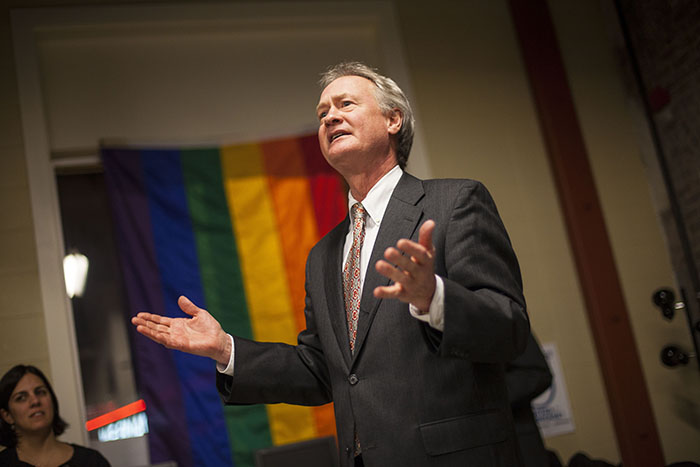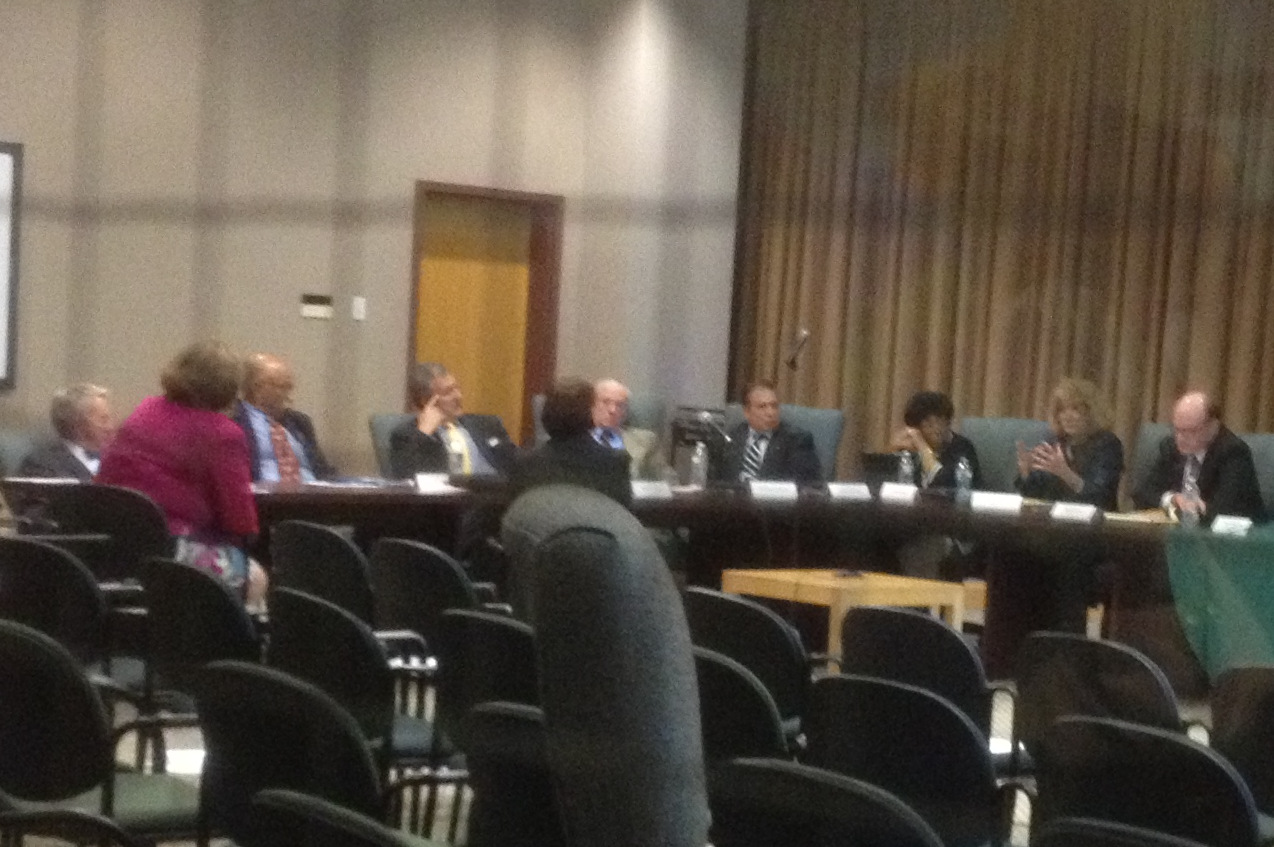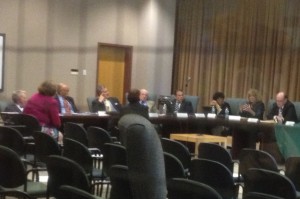 Cognitive dissonance, that uncomfortable feeling one gets when the realization strikes that two or more deeply held beliefs or values are in conflict, will often lead to wild fits of rationalization and self-deception. Hence the emergence of essays defending oxymoronic phrases such as “compassionate conservatism” and “just war.” On their face, these terms are virtually meaningless, it is only with long and torturous rationalizations, double speak and outright falsehoods that the terms are explained and the terminology “justified.” The cognitive dissonance is banished in a puff of syntactical gobbledy-gook.
Cognitive dissonance, that uncomfortable feeling one gets when the realization strikes that two or more deeply held beliefs or values are in conflict, will often lead to wild fits of rationalization and self-deception. Hence the emergence of essays defending oxymoronic phrases such as “compassionate conservatism” and “just war.” On their face, these terms are virtually meaningless, it is only with long and torturous rationalizations, double speak and outright falsehoods that the terms are explained and the terminology “justified.” The cognitive dissonance is banished in a puff of syntactical gobbledy-gook.
How else to explain the June 5th editorial by Justin Katz “Catholics grapple with political change” that appeared in the Providence Journal? Katz seems intent on tying the diminishing political power and moral influence of the present day Catholic Church to what he sees as the growing ease New Englanders have with “tolerance for the authority of others over them.”
Apparently, by turning away from the Catholic Church, a non-democratic hierarchical institution that claims absolute moral authority over all aspects of life and afterlife, and embracing government, a democratic hierarchical institution that merely exercises secular authority, we have given up something of value. The implication is that we have abandoned the one true religion in favor of a new religion, government.
This is of course a very foolish thing to say. Katz implies that religion is impossible to escape, since any rejection of the rules of the Catholic Church automatically makes one a member of the High Church of Government. Katz makes his view quite clear:
In the case of marriage, with narrow exceptions, the state government has essentially issued a command: “Thou shalt treat same-sex relationships as equivalent to opposite-sex relationships.”
Note that Katz conflates the laws of Rhode Island with Biblical edicts. In contrasting secular law with religious commandments Katz is forcing a choice: either the church sets the parameters of the state, or the state has de facto become the church. Under Katz’s formulation their can be no separation of church and state, no renderings to Caesar that which is his or unto the government its due. There is only one supreme authority, and a choice must be made.
But wait, there’s a curious wrinkle to Katz’s essay:
In Catholicism, the individual’s conscience is sacrosanct, and to be shaped by the church’s teachings. In government, the individual’s conscience receives only that space that government officials have deigned to carve out for it.
The history of the Catholic church is not one of an institution that respects the individual’s conscience. In fact, one need only look at the treatment of heretics, the witch trials, the Crusades, the Inquisition, and the Protestant Reformation to see that. I’m sure the individual conscience of Galileo was assuaged by Pope John Paul II’s apology, 367 years too late. One struggles to understand, in the face of so much war and violence against individual conscience by the Catholic Church, what Katz takes the word “sacrosanct” to mean.
Certainly one can make similar claims about the role of the United States government in many terrible violations of persons and consciences: the genocide of Native Americans, our terrible history of slavery and racism, the dropping of atomic bombs on Japan, the environmental destruction our policies continue to have on the world ecology, and our casual acceptance of economic inequality, never mind our second class treatment of women, a shame our country shares with the Catholic Church.
But the United States can change. In fact, it’s based on a Constitution built to change and adapt, not upon a perfect and revered holy book or tablets carved by God. The United States government can be changed from within, by the electorate, via direct action on the part of its citizens. This is because the United States is a product of the Age of Reason, aka the Enlightenment. This was a movement dedicated to the improvement of society through reason and the scientific method, and to challenging old ideas based on faith and tradition.
Enlightenment concepts were revolutionary because all previous authority, whether we thought of it as governmental or religious, was ultimately religious in nature. Kings were chosen by Gods, and the people merely persevered. Personal conscience was irrelevant. Remember that one of the major institutions leading the charge against the Enlightenment was the Catholic Church. It was only the pressure of Enlightenment ideals that forced the church to forgive Galileo, accept the reality of Darwinian evolution and accept the moral right of Jews to exist unmolested.
Katz would have us believe that the Catholic Church is a better guarantor of conscience than the government. He decries governmental intrusion into the marriage equality debate, into reproductive health care and opposes taxpayer funded pre-kindergarten programs. However, when it comes to government sponsored prayers on the walls of public schools, or Christmas versus holiday trees, suddenly government intrusion is fine.
This level of cognitive dissonance, far from being a mere “uncomfortable feeling” would make most people’s head’s explode. But not Katz. He’s busy playing the victim card.
One suspects, however, that Bishop Tobin’s most difficult task, in preparing for his own presentation at the [“Catholicism and the American Experience?”] conference, has been narrowing down the topics that Rhode Island has provided him under Governor Chafee (a left-wing Democrat).
That’s right, Katz is asserting that the heavy hand of government has deprived the Bishop of his ability to speak up on certain issues. One pictures a furtive Tobin, consigned by a despotic Governor Chafee to a dark, dank cell somewhere, smuggling his letters and thoughts out on small scraps of paper to a church forced underground because gay people now have the right to marry each other. Never mind that the church is protected from ever having to perform a same-sex wedding and that their right to discriminate is protected by the First Amendment to the Constitution: Bishop Tobin and the Catholic Church are the victims here.
Katz ends his foolish piece with questions. “What should our relationship with government be? What mediating role should the church play in a representative democracy? Questions upon questions.” Of course, Katz doesn’t really attempt to answer these questions. His whole essay is an attempt to confuse and sow doubt into the minds of readers. Katz seeks to undermine our faith in representative democracy because his view is that government should be small, ineffective and out of the way.
It should be clear by now that Katz, who can seemingly handle any amount of cognitive dissonance his varied views demand, has no problem marrying his Catholic faith to his libertarian (or even Objectivist) views. A small, non-intrusive government that bans same-sex marriage and monitors women for birth control violations? No problem. A church that treats the individual’s conscience as sacrosanct but mandates prayers and Christmas Trees in public spaces? Why not?
Reason be damned. Believe what you want. Who cares how many people suffer? There are no wrong answers.
Except, of course, as Justin Katz amply demonstrates, there are.
 Yesterday, the ACLU filed a major federal lawsuit in response to last week’s chilling disclosure that the federal government obtained millions of phone call information records from Verizon as a routine matter. Despite the enormous privacy concerns raised by this unprecedented data-mining collaboration, the General Assembly is poised to pass a bill that would specifically allow both federal and state officials to similarly obtain the location tracking information of any Rhode Island cell phone subscriber for any reason and at any time.
Yesterday, the ACLU filed a major federal lawsuit in response to last week’s chilling disclosure that the federal government obtained millions of phone call information records from Verizon as a routine matter. Despite the enormous privacy concerns raised by this unprecedented data-mining collaboration, the General Assembly is poised to pass a bill that would specifically allow both federal and state officials to similarly obtain the location tracking information of any Rhode Island cell phone subscriber for any reason and at any time.





































